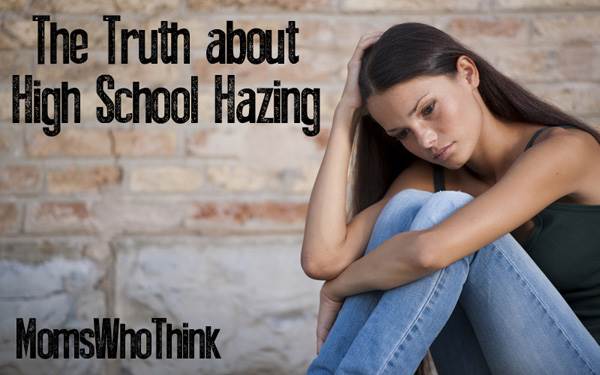

The Facts About High School Hazing
High school hazing is a complex issue. Some people see it as nothing more than a high-spirited set of rituals designed to bond a group and enforce a hierarchy. The mentality is roughly that if you can survive all this together, then you'll be a part of the pack. You can only survive if you follow the leaders.
Others think of hazing as a much more dangerous phenomenon. They recall horror stories about pranks gone wrong or children whose alienation leads to their deaths. No matter what you think about the issue of hazing, it is important that you are aware of it and how it might affect your child.
The Facts About High School Hazing
Hazing is Wrong, Hazing is Illegal
Though many people defend hazing rituals as valuable traditions, hazing is actually a practice that is designed to enforce the power of the group over chosen victims. It is illegal in forty-four states. In addition, most colleges have instituted anti-hazing policies and rules to govern the practice and prevent it. Despite the attempts to end hazing practices by making it clear how unacceptable they are, hazing continues to occur in our society.
It continues to be excused by both observers and participants. High schools are a common site for hazing, particularly on athletic teams and in other activity-related clubs and groups. The practice is particularly dangerous at this age because of the fragility of the developing adolescent. Your child's much needed self-respect is truly under threat by hazing behavior. The effects can be powerful and far-reaching, whether they are the victim or a participant.
What You Should Do About Hazing
It is important to be concerned about hazing and to take a strong offensive position against the practice. Hazing is such an entrenched part of the culture, and one that is reinforced by mass media as well as other adult role models, that you need to take a stand as soon as the issue raises its head. Begin by discovering the school's position on the matter. Some schools have taken the first necessary step and have anti-hazing policies in place to protect their students. Alone, these policies may not do much.
You will need to find out if they are enforced. If you think your child is the victim of hazing, then bring the matter to the attention of the school. You should also be aware of the law in your state. That way, if you encounter resistance to your attempts to shut hazing down, you can use the law to provide your efforts with the support you need. Consider whether transferring your child to another school may be necessary.
Remember that the practice is illegal in most states. In addition, there are many states that make civil suits regarding hazing possible. You can use this information as ammunition in the fight. The most important thing you can do, however, is to stand up for your child and any other who might be a victim of hazing. Let the world know that hazing is not okay and that you will fight to stop it.
Talking to Your High Schooler About Hazing
Having a conversation with a teenager can be tough. They have a desire to be independent, so listening to mom or dad is not always at the top of their list. Nonetheless, you need to make an effort to talk to them about hazing. It's important that your child is aware of this practice, so they can recognize it and report it if it gets out of hand.
Don't be overly dramatic when talking to your child about hazing, as this makes it less likely you'll be heard. Not every instance of hazing results in bodily harm or death. Rather than making it out to seem like hazing is always life-threatening, simply make your teen aware that it is a possibility when hazing is taken too far.
Make your anti-hazing stance clear with your child. Make sure they know that you will not tolerate them participating in any hazing activities. If you find out that they are, they'll be removed from whatever team or club is partaking in the activity. If you do find out that your teen is participating in hazing, consider the reasons why. They may need professional intervention via a therapist, or a transfer to a school with better influences.
By having a mature and reasonable discussion about hazing with your child, you can ensure that they're informed and prepared in case they encounter this practice. Always keep lines of communication open with your child. If they come to you to tell you that they've been hazed, don't get overly emotional. Try to handle the situation calmly and rationally.
High School Hazing in the News
Unfortunately, hazing is a very real and ongoing problem in American high schools. In mid-July 2023, a high school football team in Massillon, Ohio was placed under investigation after allegations of hazing surfaced. Student privacy laws prohibit the school from sharing details about the investigation, but up to 15 students may be involved.
Back in February of 2023, students at Glacier High School in Montana were disciplined following a hazing incident on the wrestling team. The hazing allegations included accusations of sexual assault. Two students were ordered to complete a restorative justice workshop that aims to divert youth from criminal behavior. Their return to the wrestling team is contingent on their completion of the workshop.
These are just two recent examples of hazing in high schools. It's critical that you are in the know about the real risk that this practice holds for your high school student. Make sure your child knows that they can always come to you about anything that they experience. If your child comes to you to talk about a hazing experience, listen and don't judge. From there, you can take the steps necessary to rectify the situation.